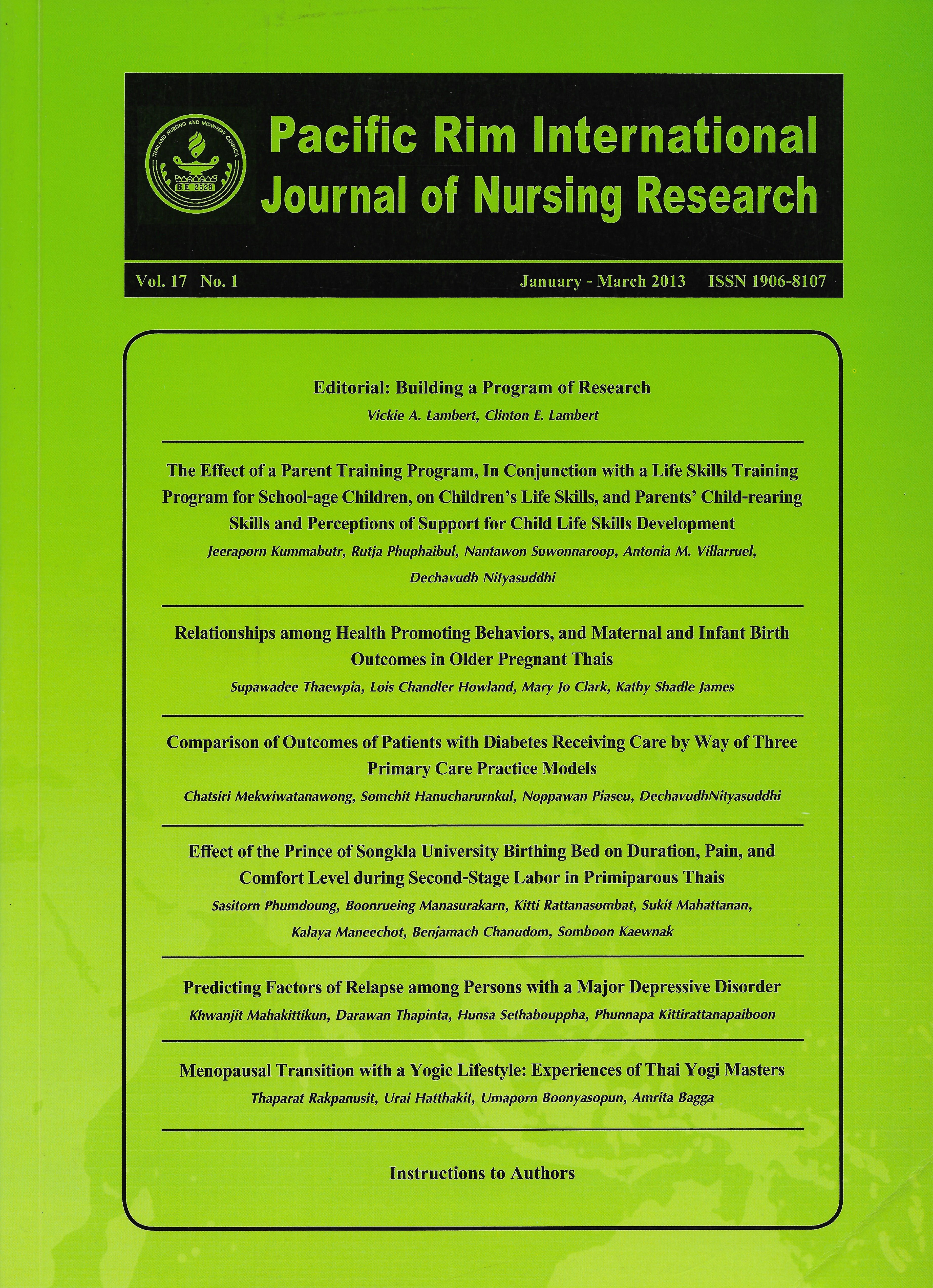The Effect of a Parent Training Program, In Conjunction with a Life Skills Training Program for School-age Children, on Children’s Life Skills, and Parents’ Child-rearing Skills and Perceptions of Support for Child Life Skills Development
Keywords:
Children’s life skills, Training program, School-age children, Parents’ perceptions,Abstract
Abstract: This quasi-experimental study sought to examine the effect of a parent training program, in conjunction with a life skills training program for school-aged children, on children’s life skills, and parents’ child-rearing skills and perceptions of support for child life skills development. One school was purposively selected, from which two 5th grade classes were randomly assigned to either the experimental group or the comparison group. The parent and student study participants, who met the inclusion criteria and consented/assented to take part in the study, included 26 student/parent dyads in the experimental group and 27 student/parent dyads in the comparison group. All students were recruited into the life skills training program, while only parents of the students assigned to the experimental group were recruited into the parent training program. The principle investigator based these programs on the Theory of Planned Behavior and interactive group techniques. Instruments for data collection included: a Life Skills Questionnaire for School-aged Children; and, the researcher-developed Child Life Skills Development Questionnaire for Parents. Data were collected on all participants prior to implementation of both programs, immediately following each program’s completion, and one month and three months after each program’s completion. Analysis of covariance (ANCOVA) and repeated measures ANOVA were used to test the effect of the parent training program.
The results demonstrated no significant effect of the parent training program on the children’s life skills, the parents’ attitudes, and their subjective norms regarding child life skills development. Positive effects, however, were seen on the parents’ child-rearing skills that supported child life skills development, self-efficacy toward child life skills development, and intention to engage in child-rearing skills that supported child life development. These findings suggest this intervention may require a longer duration of implementation, so as to improve child life skills. Recommendations for further research include a larger sample size and a longer period for outcome measurements.
บทคัดย่อ: การศึกษาเชิงทดลองครั้งนี้มีวัตถุประสงค์ เพื่อศึกษาผลของโปรแกรมอบรมพ่อแม่เพื่อพัฒนา ทักษะชีวิตร่วมกับโปรแกรมอบรมทักษะชีวิตในเด็กวัยเรียนต่อทักษะชีวิตของเด็กวัยเรียน ทักษะพ่อแม่ และ การรับรู้ต่อการพัฒนาทักษะชีวิตในบุตรวัยเรียน โดยศึกษาในกลุ่มเด็กวัยเรียนชั้นประถมศึกษาปีที่ 5 และพ่อแม่ ซึ่งอาศัยในกรุงเทพมหานคร กลุ่มตัวอย่างถูกเลือกโดยวิธีการสุ่มอย่างเฉพาะเจาะจงทั้งในระดับโรงเรียนและ ชั้นเรียน นักเรียนชั้นประถมศึกษาปีที่ 5 พร้อมทั้งพ่อแม่ที่มีคุณสมบัติตรงกับปัจจัยการคัดเข้าและยินยอม เข้าร่วมโปรแกรม ถูกสุ่มเข้ากลุ่มทดลองซึ่งประกอบด้วยนักเรียน 26 คนและพ่อแม่ และกลุ่มเปรียบเทียบ จำนวน 27 คนและพ่อแม่ ในระดับห้องเรียน นักเรียนทั้ง 2 กลุ่ม ได้รับการอบรมทักษะชีวิตในขณะที่เฉพาะ กลุ่มพ่อแม่ในกลุ่มทดลองเท่านั้นที่ได้รับการอบรมพ่อแม่เพื่อพัฒนาทักษะชีวิตในบุตรวัยเรียน โปรแกรมอบรม พ่อแม่เพื่อพัฒนาทักษะชีวิตในบุตรวัยเรียน และโปรแกรมอบรมทักษะชีวิตในเด็กวัยเรียนถูกสร้างขึ้นบนกรอบ แนวคิดของทฤษฎีพฤติกรรมตามแผน และการอบรมให้ความรู้ ฝึกทักษะการปฏิบัติ และการแลกเปลี่ยน ประสบการณ์ โดยทำการเก็บข้อมูลในนักเรียนทั้ง 2 กลุ่ม ด้วยแบบสอบถามทักษะชีวิต และในกลุ่มพ่อแม่ทั้ง สองกลุ่มด้วยแบบสอบถามการพัฒนาทักษะชีวิตในเด็ก ซึ่งทำการเก็บข้อมูล ก่อนได้รับโปรแกรมและภายหลัง โปรแกรมสิ้นสุดแล้วที่ 1 สัปดาห์ 1 เดือน และ 3 เดือน และการวิเคราะห์ข้อมูลส่วนบุคคลด้วยสถิติเชิง พรรณนา และวิเคราะห์ผลของโปรแกรมด้วยสถิติการวิเคราะห์ความแปรปรวนร่วม ความแปรแปรนทางเดียว และสองทางแบบวัดซ้ำ
ผลการวิจัยพบว่า ภายหลังสิ้นสุดการทดลอง คะแนนทักษะชีวิตในนักเรียนทั้งสองกลุ่มไม่แตกต่างกัน ในขณะที่คะแนนทักษะพ่อแม่ (ES=1.22) ความสามารถของพ่อแม่ (ES=0.65) และความตั้งใจในการพัฒนา ทักษะชีวิตในบุตรวัยเรียนของพ่อแม่ (ES=0.46) ในกลุ่มทดลองสูงกว่ากลุ่มเปรียบเทียบในการวัดผลเมื่อ 3 เดือนภายหลังโปรแกรมสิ้นสุด ถึงแม้ว่าคะแนนการรับรู้อื่นๆของพ่อแม่รวมถึงคะแนนทักษะชีวิตของนักเรียน จะไม่แตกต่างกันอย่างมีนัยสำคัญระหว่างสองกลุ่มและตลอดเวลา จากผลการศึกษาแสดงให้เห็นว่า โปรแกรม การพัฒนาทักษะชีวิตที่ผนวกรวมโปรมแกรมการอบรมพ่อแม่และโปรแกรมการพัฒนาทักษะชีวิตในเด็กวัย เรียนนี้อาจจะต้องการเวลาที่ยาวนานขึ้นในการปรับพัฒนาทักษะชีวิตในเด็กวัยดังกล่าว ข้อเสนอแนะในการ ศึกษาครั้งต่อไปคือการใช้จำนวนกลุ่มตัวอย่างที่มากขึ้นและใช้การวัดผลในระยะยาว
Downloads
How to Cite
Issue
Section
License
Copyright: The Pacific Rim International Journal of Nursing Research, Thailand Nursing & Midwifery Council has exclusive rights to publish, reproduce and distribute the manuscript and all contents therein.








.png)



